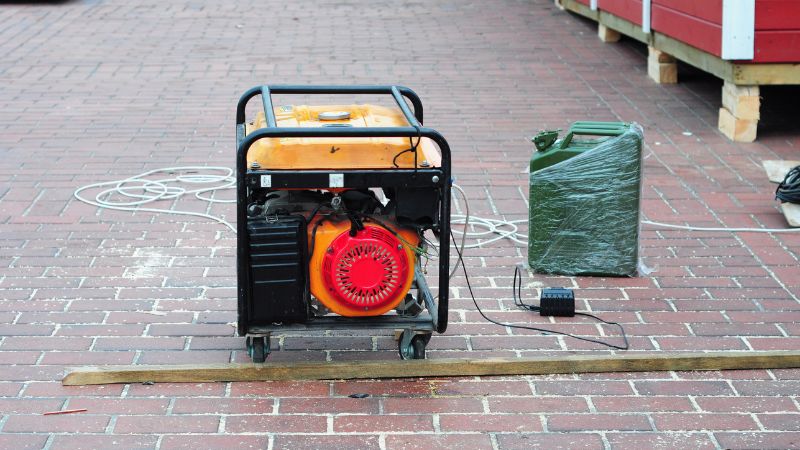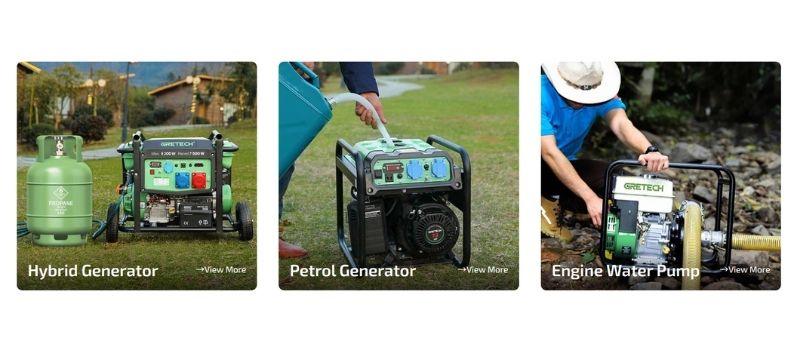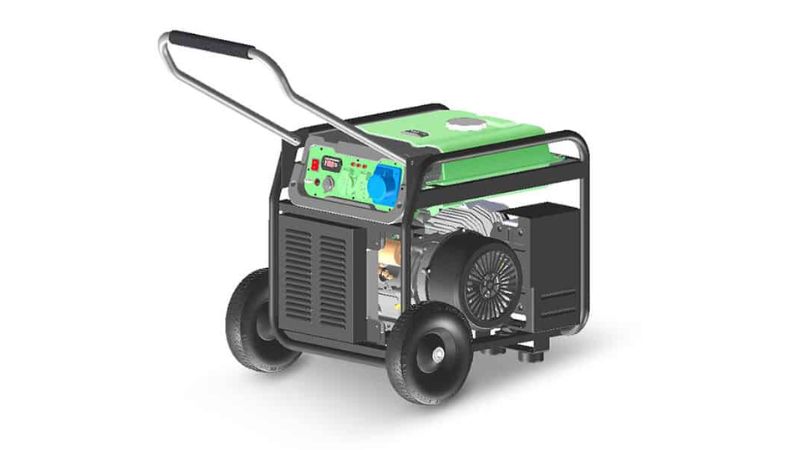
For anyone who lives in an area prone to storms, natural disasters, or other events that cause power outages, having a generator is essential. Knowing something about this machine can help you pick the right one for your needs and use it safely and efficiently.
In this guide, we will walk through everything you need to know, from the basics to maintenance.
What Is a Backup Generator
A backup generator is a device that provides electricity when your main power source goes out. This power supply usually runs on fuels such as natural gas, propane, or diesel. It automatically or manually turns on to keep your essential systems—like lights, heating, and medical devices—running during power outages. This makes sure your home or business stays safe and functional when the power grid fails. You can think of it as an emergency power supply.
Most backup generators include an automatic transfer switch. This device detects the power loss and switches your electrical system from the main power grid to the generator. It makes sure power flows without you needing to do anything.
Types of Backup Generators
You can choose from several types of generators depending on your needs. Each type has different features, costs, and uses.
- Portable Generators are small and easy to move. They are good for short-term power outages or outdoor use. These generators are affordable but need manual setup and fueling.
- Standby Generators are installed outside your home and connect directly to your electrical system. They turn on automatically when the power goes out. These are more reliable and best for long-term use.
- Inverter Generators produce clean electricity, which is safe for sensitive devices. They are quieter and more fuel-efficient but cost more than portable types.
Choosing the right generator depends on how long you want power, what you need to run, and your budget. You can use this information to pick the best type for your situation.
Benefits of Backup Generators
A backup generator provides continuous power for your home during outages. This means your lights, appliances, and important devices will keep working when the main power goes out.
- You can protect sensitive electronics from damage caused by power surges or sudden outages. This helps avoid costly repairs or replacements.
- Backup generators maintain your home’s security systems. With power, alarms, cameras, and locks will continue working, giving you peace of mind.
- They also keep your home comfortable. Heating, cooling, and refrigeration won’t stop, which is important for safety and convenience.
- Meanwhile, using a generator can increase your property’s value. Many buyers see backup power as a useful feature, especially in areas with frequent storms or power issues.
- Modern generators run quietly, similar to an air conditioner. They provide power without the loud noise that older models often make.
These advantages help you stay safe, comfortable, and prepared during power outages.
Selecting the Right Backup Generator
When choosing a backup generator, start by considering how much power you need. List your most important devices, like your fridge, lights, and heating system. Add up their wattage to find the minimum capacity your generator must support.
Next, think about the fuel type. Generators often run on gasoline, propane, or natural gas. Gasoline generators are common but need careful storage. Propane and natural gas models connect to home lines and can run longer without refueling.
You will need to decide between a portable generator and a standby generator. Portable generators are cheaper and easy to move but require you to connect extension cords or operate them outside. Standby generators automatically turn on when power goes out and connect to your home’s wiring, but they cost more and need professional installation.
Here is a simple checklist to guide your choice:
| Factor | What to Think About |
|---|---|
| Power capacity | Match your devices’ total wattage |
| Fuel type | Gasoline, propane, or natural gas |
| Generator type | Portable (affordable) or standby (automatic) |
| Connection method | Extension cords or transfer switch |
| Budget | Purchase cost plus installation fees |
GRETECH Generators: The Trusted Choice for Backup Power

Why Choose Us?
GRETECH has been manufacturing gas/gasoline generators for many years and is one of the few manufacturers in the world that specializes in home/office standby gas generators.
Our patented technologies make us the pioneer in the industry and bring great benefits to the users:
- Better power output efficiency. Under LPG, Gretech generators have the same good power output as gasoline.
- Lower fuel consumption and use cost: LPG,0.36 kg/kW.h; NG 0.35 m3/kw.h; gasoline, 0.9l/kw.h.
- Safe to use. The gas mixing valve will automatically shut off the gas supply, once the engine is stopped. There is no leakage at all if users forget to turn off the gas valve.
- Lower noise. Our generator is around 5 dB less than the normal in the market.
- Compatible with source pressure ranging from 2.0 to 6.0kPa(0.29-0.87PSI).
Our hybrid generator offers numerous benefits:

- High Efficiency: Automatically optimizes the air-fuel ratio to deliver power equivalent to gasoline generators, with exceptionally stable operation.
- Superior Durability: Engine life expectancy is more than double that of comparable gasoline models.
- Cost-Effective: Significantly lower fuel consumption costs compared to gasoline, at 75% rated power.
- Leak-Proof Safety: Unique mixing valve design prevents any gas leakage, even with the switch on.
- Easy Starting: Starts reliably within three pulls, whether new or after storage.
- Wide Compatibility: Compatible with a broad gas pressure range (2.0-6.0 kPa) for use in diverse environments.
- Eco-Friendly: Ensures complete fuel combustion, resulting in clean emissions.
Installation Considerations
When installing a backup generator, you need to think about several important factors first. This helps make sure the system works safely and reliably when you need it.
Start by choosing the right location for your generator. It should be placed outdoors, away from windows, doors, and vents. This prevents dangerous exhaust fumes from entering your home. Also, Site preparation such as leveling the ground and providing a proper foundation is necessary.
Next, consider how your generator will connect to your home’s electrical system. A manual or automatic transfer switch is required to safely switch power from the grid to the generator.
Lastly, check local permits and regulations before installation. This avoids legal issues and ensures your setup is compliant.
Professional installation is highly recommended to ensure the transfer switch and wiring meet local building codes and safety standards.
Backup Generator Maintenance
A generator is a mechanical device, and it needs regular care to be reliable in an emergency.
- Regular Testing: Run your generator for about 15-20 minutes every month (as per manufacturer instructions) to keep the engine lubricated and the battery charged.
- Fuel Management: For portable generators, use fresh fuel and add a stabilizer if you plan to store it. For propane, check tank levels regularly.
- Oil and Filter Changes: Like a car, generators need periodic oil and spark plug changes. Check the owner’s manual for the service schedule.
- General Inspection: Keep the unit clean and clear of debris, snow, or insect nests.
Frequently Asked Questions
How does a backup generator function during a power outage?
When the power goes out, a backup generator detects the loss automatically. It then starts running to supply electricity to your home. Some models switch on within seconds to keep your appliances running without interruption.
What types of backup generators are available on the market?
You can choose between standby generators and portable generators. Standby generators are fixed and turn on automatically. Portable generators are smaller, movable, and need manual startup. Fuel options include gas, diesel, propane, and natural gas.
Can a backup generator power an entire house, and for how long?
A properly sized standby generator can power your entire home. The duration depends on available fuel and the generator’s capacity. With a continuous fuel supply, generators can run as long as needed during outages.
What are the safety concerns associated with operating a backup generator?
Never use a generator indoors or in enclosed spaces to avoid carbon monoxide poisoning. Ensure proper grounding to prevent electrical shocks. Follow manufacturer guidelines and keep it away from moisture and flammable materials.
Conclusion
A backup generator is far more than a simple appliance—it is your frontline defense against the disruption and danger of power outages. By understanding the different types, benefits, and key considerations for selection and maintenance, you are now equipped to make an informed decision that safeguards your home and your family.
